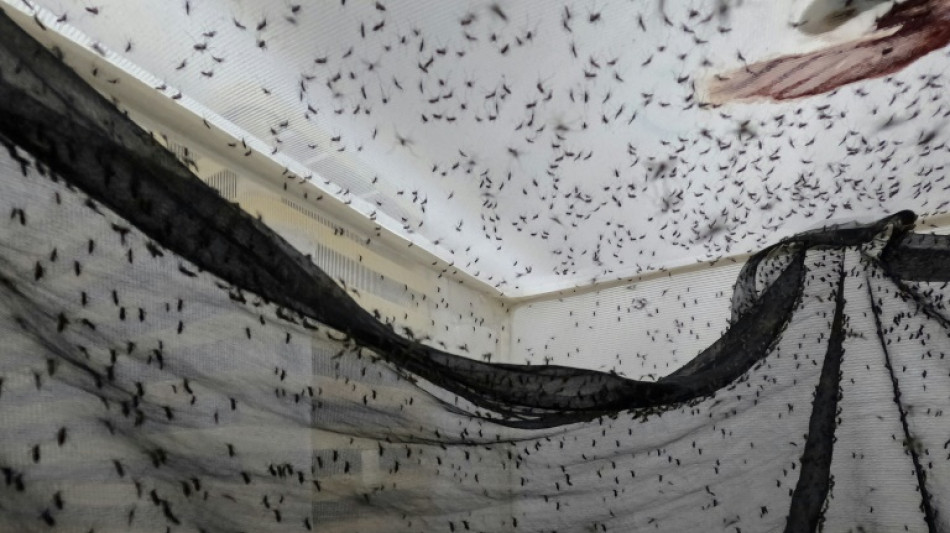
-
 SFWJ / Medcana Announces Strategic Expansion Into Australia With Acquisition of Cannabis Import and Distribution Licenses
SFWJ / Medcana Announces Strategic Expansion Into Australia With Acquisition of Cannabis Import and Distribution Licenses
-
US to withdraw some 1,000 troops from Syria

-
 Four killed after spring storms wreak havoc in the Alps
Four killed after spring storms wreak havoc in the Alps
-
Spurs' Popovich reportedly home and well after 'medical incident'

-
 Trump goes to war with the Fed
Trump goes to war with the Fed
-
Celtics chase second straight NBA title in playoff field led by Thunder, Cavs

-
 White House site blames China for Covid-19 'lab leak'
White House site blames China for Covid-19 'lab leak'
-
Norris edges Piastri as McLaren top Jeddah practice

-
 Trump warns US could ditch Ukraine talks if no progress
Trump warns US could ditch Ukraine talks if no progress
-
Judge denies Sean 'Diddy' Combs push to delay trial

-
 80 killed in deadliest US attack on Yemen, Huthis say
80 killed in deadliest US attack on Yemen, Huthis say
-
Lebanon says two killed in Israeli strikes in south

-
 Trump says US will soon 'take a pass' if no Ukraine deal
Trump says US will soon 'take a pass' if no Ukraine deal
-
F1 success is 'like cooking' - Ferrari head chef Vasseur

-
 Cycling mulls slowing bikes to make road racing safer
Cycling mulls slowing bikes to make road racing safer
-
Macron invites foreign researchers to 'choose France'

-
 Klopp 'happy' in new job despite Real Madrid rumours: agent
Klopp 'happy' in new job despite Real Madrid rumours: agent
-
Alcaraz into Barcelona semis as defending champion Ruud exits

-
 Vance meets Italy's Meloni before Easter at the Vatican
Vance meets Italy's Meloni before Easter at the Vatican
-
Evenepoel returns with victory in Brabantse Pijl

-
 Maresca confident he will survive Chelsea slump
Maresca confident he will survive Chelsea slump
-
Mob beats to death man from persecuted Pakistan minority

-
 Lebanon says one killed in Israeli strike near Sidon
Lebanon says one killed in Israeli strike near Sidon
-
Arsenal's Havertz could return for Champions League final

-
 US officials split on Ukraine truce prospects
US officials split on Ukraine truce prospects
-
Client brain-dead after Paris cryotherapy session goes wrong

-
 Flick demands answers from La Liga for 'joke' schedule
Flick demands answers from La Liga for 'joke' schedule
-
'Maddest game' sums up Man Utd career for Maguire

-
 Trial opens for students, journalists over Istanbul protests
Trial opens for students, journalists over Istanbul protests
-
Gaza rescuers say Israeli strikes kill 24 after Hamas rejects truce proposal

-
 'Really stuck': Ukraine's EU accession drive stumbles
'Really stuck': Ukraine's EU accession drive stumbles
-
'Not the time to discuss future', says Alonso amid Real Madrid links

-
 74 killed in deadliest US attack on Yemen, Huthis say
74 killed in deadliest US attack on Yemen, Huthis say
-
Southgate's ex-assistant Holland fired by Japan's Yokohama

-
 Vance meets Meloni in Rome before Easter at the Vatican
Vance meets Meloni in Rome before Easter at the Vatican
-
Ryan Gosling to star in new 'Star Wars' film

-
 Hamas calls for pressure to end Israel's aid block on Gaza
Hamas calls for pressure to end Israel's aid block on Gaza
-
Russia says Ukraine energy truce over, US mulls peace talks exit

-
 58 killed in deadliest US strike on Yemen, Huthis say
58 killed in deadliest US strike on Yemen, Huthis say
-
Museums rethink how the Holocaust should be shown

-
 Three dead after deadly spring storm wreaks havoc in the Alps
Three dead after deadly spring storm wreaks havoc in the Alps
-
No need for big changes at Liverpool, says Slot

-
 Bloody Philippine passion play sees final performance of veteran 'Jesus'
Bloody Philippine passion play sees final performance of veteran 'Jesus'
-
New US envoy prays, delivers Trump 'peace' message at Western Wall

-
 Postecoglou sticking around 'a little longer' as Spurs show fight in Frankfurt
Postecoglou sticking around 'a little longer' as Spurs show fight in Frankfurt
-
US threatens to withdraw from Ukraine talks if no progress

-
 Tears and defiance in Sumy as Russia batters Ukraine border city
Tears and defiance in Sumy as Russia batters Ukraine border city
-
Russia rains missiles on Ukraine as US mulls ending truce efforts

-
 Tokyo leads gains in most Asian markets on trade deal hopes
Tokyo leads gains in most Asian markets on trade deal hopes
-
Two missing after deadly spring snowstorm wreaks havoc in the Alps


Colombian mosquito factory fights dengue and disinformation
The jars of larvae in stagnant water and thick clouds of mosquitoes at a Colombian lab may seem like the stuff of nightmares. They are in fact crucial to a project to fight the spread of dengue fever.
For nearly ten years, the World Mosquito Program (WMP) has been replacing local populations of Aedes aegypti mosquitoes with biologically modified insects to prevent the spread of a virus that has killed over 4,500 in Latin America and the Caribbean so far this year.
Rather than deploying harmful insecticides, "this technology is designed so that a living bacterium, within a mosquito -- an organism that is also alive -- can be released to continue preserving life," said biologist Nelson Grisales.
The project, supported by American multi-billionaire Bill Gates, has achieved promising results: dengue cases have fallen 95 percent in the northwestern Antioquia department, health authorities say.
Gates is a popular target of conspiracy theories and the mosquito project is no different, with viral rumors "that the mosquitoes we release are equipped with Bill Gates' mind control chips, that they can make people homosexual or that they transmit stronger diseases," said Grisales.
Rather, scientists are producing mosquitoes infected with Wolbachia, a bacteria common in other insect and mosquito species, hoping the Aedes aegypti will spread it in the wild.
Wolbachia works in two ways: it boosts a mosquito's immune system, making it less likely to contract dengue.
But if the mosquito does get infected, Wolbachia makes it harder for the virus to grow inside the insect and be transmitted to humans.
"This is not a genetic modification," said another biologist at the WMP, Beatriz Giraldo.
"The bacteria enters the mosquito cell and makes a biological modification."
- As planet warms, dengue spreads -
People will still suffer an annoying mosquito bite, but will be spared dengue fever, which causes joint and bone pain, earning it the nickname "breakbone fever."
The virus can provoke hemorrhagic fever in severe cases, and even death.
Dengue cases have soared in recent decades, and Latin America experienced its worst outbreak on record in the first months of 2024, attributed to a muggy summer intensified by the El Nino weather phenomenon.
The European Union's health agency has warned of rising cases in Europe as climate change creates warmer conditions perfect for mosquito breeding.
In Colombia, the modified mosquitoes are brought in jars to areas hard-hit by the virus and released into the wild to breed with, and slowly replace, local populations.
Wolbachia's dengue-fighting abilities were discovered by scientists in Australia, where the first trials were held in 2011.
In Colombia, the first infected mosquitoes were introduced in the city of Medellin in 2015, and the project was later taken to the city of Cali.
The same experiment has been conducted in Indonesia and Brazil and will soon be implemented in El Salvador.
The program "has accelerated at the same time as the dengue problem has grown," said Grisales.
For now, the project operates as a private initiative authorized by local authorities, but Grisales hopes it will soon become "public policy."
In Cali, where Wolbachia mosquitoes have been flying since 2019, "many people did not like the initial impact of the mosquito releases," said resident Albency Orozco.
"But as the monitoring and proper explanations were carried out, people accepted it."
P.Stevenson--AMWN



